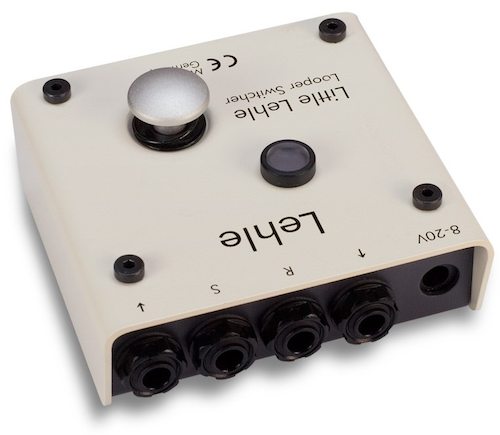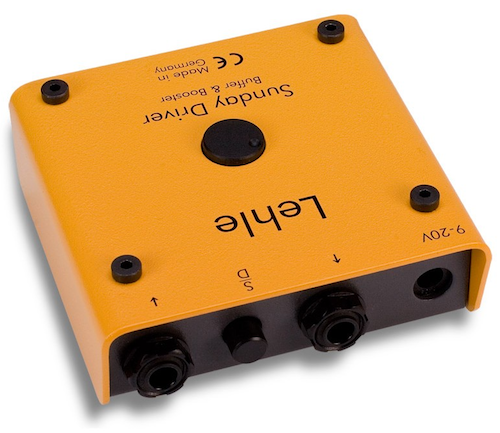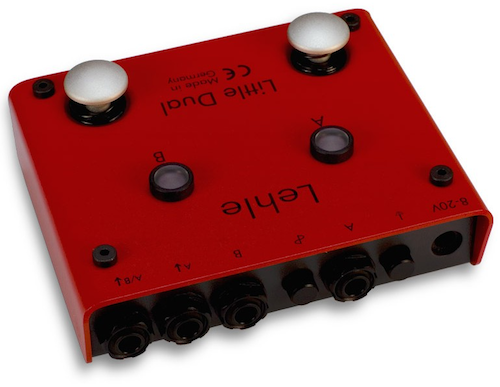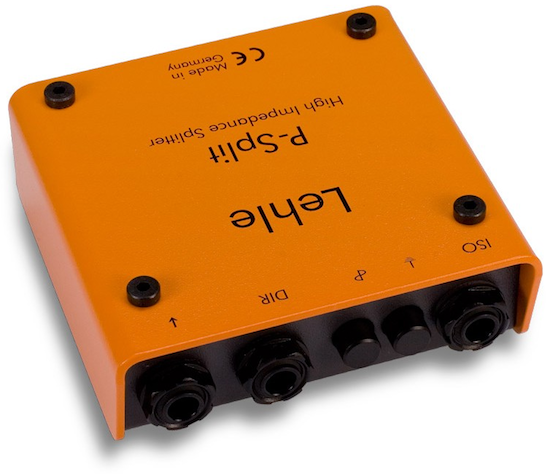LEHLE SWITCHERS REVIEW
Posted on Fri 23 August 2013 in entries
p-split, lehle sunday driver, lehle swithcer, switcher Slug: lehle-switchers-review Status: published
For those who are using a number of pedals, long cable runs, or even multiple amps, how exactly to rig all of these pieces of equipment together without suffering a loss in tonal quality can often be a cause of concern. To get a general overview on a good approach to take when piecing your rig together, please see my article entitled 'Signal Routing for Guitar & Bass - A Tone Chaser's Guide'; however, if you already know what you're looking for, but still need to find that ideal unit with which to achieve it, then please let me introduce you to Lehle Switchers!
Lehle are a German based company headed up by Burkhard Georg Lehle & their primary concern is providing us guitarists with reliable switching & routing products that eliminate tonal loss & do not generate any additional noise. They use nothing but the finest components & their unique designs really do serve to set them apart from the competition. All of their products feature gold relays throughout & their ingenious switching mechanisms are well & truly in a league of their own. Switching is completely silent (none of those horrible clunks & pops that you'd usually find with True Bypass switches) & they're so robust that Lehle guarantee a minimum of 100,000 cycles of life in every switch (although they do say that their switches can cope with up to about two million cycles in total). If you compare this to the usual 20,000 cycles that you get with the regular switches found on most other effects pedals then you may start to get an idea of just how robust these things are! I myself have been using a couple of Little Lehle's on my pedalboard for quite a few years now & I can safely say that these things really are built to last. If you're looking for an off-the-shelf solution to your signal routing needs then it is my opinion that Lehle really can't be beat.
Anyway, why don't we take a look at a selection of their individual products in a little more depth...
In a nutshell, the Little Lehle is simply a True Bypass looper & (for my money) it's the best one you are likely to find. If you have an effects pedal that sucks your tone when disengaged, or perhaps you've got a pedal that isn't True Bypass & you want to get it out of the way when it's not in use, well, the Little Lehle is undoubtably the pedal that you're looking for! It's built like a tank & the silent switching & extended switch life render it unmatched by any other True Bypass looper on the market.
In terms of layout, you have an input for connecting the signal from your guitar, an output for providing the feed to your amp & a send & return for connecting that problematic effect pedal with which you intend to use it. As the Little Lehle is a passive True Bypass unit you do not need any power to use it; however, you can connect anything between 8 & 20 volts of power should you wish to use the pedal's status LED to give you a visual indicator as to whether or not the loop is active.
In addition to its primary function of taking problematic effects pedals out of your signal path when they're not in use, there's also a number of additional ways in which you can employ the Little Lehle. Firstly, by connecting your guitar to the Little Lehle's input, an amplifier to its output & a second amp to its send jack (leaving the return disconnected), you can use it as a simple A/B amp switcher. Secondly, you can connect multiple pedals together within its send & return jacks & use it as one handy button to activate a whole chain of effects pedals all at once. You could even use it as a mute/kill switch by putting nothing at all in its send/return loop. It'd also be great for preventing any additional wear on vintage pedals whose switches have already had many years of use. There's a lot of possibilities with this little pedal &, given the Lehle build quality, it's sure to last through as many different incarnations of your setup as you could possibly wish to dream up.
The Sunday Driver is a buffer/line driver with a few twists up its sleeve. The basic idea behind a buffer/line driver is to eliminate the negative effects of long cable runs, while also allowing your guitar to see a fixed amp-like load regardless of what effects pedals you may use (this means that you guitars dynamics & treble response will remain intact & things won't turn into a muddy, lifeless mess). Buffers do this by utilising a preamp with a high- impedance input (the same as you'd find on a guitar amp) & then converting the guitar's signal from high to low impedance; thus, preventing any subsequent pedals from loading down the signal any further. The Sunday Driver performs its buffering duties with aplomb & the only way you can really beat it in this regard is by spending twice the money & having Pete Cornish himself custom-build you one of his LD-1s or LD-3s!
Now for the twists... * the Sunday Driver has two modes: 'Driver' & 'Sunday' & these are selectable by a small switch located on the back of the pedal. When in 'Driver' mode it operates like a standard buffer/line driver with a 1 Mohm input (the same as what you'd find on a guitar amp) but if you set it to 'Sunday' mode the input impedance is increased to a whopping 4 Mohm. Due to the dramatically decreased load that your pickups see when used this way, more sonic detail will be audible with the Sunday Driver in 'Sunday' mode than when you plug straight into your amp! This is useful if you want to replicate the ultra- high impedance inputs of high-end DI units like the Avalon U5 etc. rather than the input section of a guitar amp & I can see it being particularly handy when used with an acoustic or bass guitar. Think of it this way: use 'Driver' mode if you wish for your guitar to think that it's being plugged into a guitar amp, use 'Sunday' mode if you want it to think it's being plugged into a studio DI*.
Now for the second twist! * The Sunday Driver also features a boost knob that can add up to 15dB of gain to your signal* (the knob itself is cleverly recessed into the pedal's housing & this helps to prevent accidental changes to its setting). This means that you can also use the Sunday Driver as a clean boost to push your amp (or drive pedal) that little bit harder. Granted, the boost function will only really prove useful in this way if you're using it as a secondary buffer at the end of your effects chain (i.e. just before your amp), or if you place your drive pedal first in line after it; however, it's certainly an extra feature that could be handy in certain applications & it doesn't hurt to have the option. Additionally, by using the boost knob to dial in the optimal signal level, you could even use the Sunday Driver as a preamp for connecting your guitar directly to your audio interface when recording. This could prove extremely handy for people using amp sim plugins in their DAW, or for those who wish to capture a clean, unadulterated guitar track for re-amping later down the line.
In summation, as a buffer/line driver, * the Sunday Driver is a top-rate performer & probably the best off-the-shelf option you're likely to find*. With the addition of a few extra features, Lehle have provided us with a unit that can be used in a multitude of different ways & the Sunday Driver could certainly prove to be a handy little utility to have at your disposal.
The Little Dual is Lehle's answer to an amp switcher; if you've been dreaming of a bi-amp setup then this is your puppy! It features Lehle's LTHZ transformer (which essentially means that both outputs are completely isolated from one another & hum/noise is eliminated).
There are two footswitches atop the unit: one for toggling between amplifiers & one for activating both amps at the same time. In addition to this, the Little Dual also features two inputs that allow you to route stereo sources as desired. There's a number of players who could really benefit from this: bassists who wish to get their dirt through one amp, whilst still achieving a clean & clear bottom end through another (think of Billy Sheehan or Dug Pinnick as shining examples of this); players who want to achieve stereo effects that ping- pong from one amp to another; or even acoustic musicians who have multi-pickup systems loaded in their instruments.
As with the Little Lehle, it is also possible to use the Little Dual as a mute/kill switch by only connecting one amp to the unit & then using the A/B switch as your 'mute' button. It probably wouldn't wouldn't be sensible to purchase it especially for this task (given the additional cost); still, the flexibility is there should you need it.
Another nice feature of the Little Dual is that, when either amp A or B is activated, the unit is essentially True Bypass as your guitar's signal gets passed straight through to the respective amp without seeing anything in between. The Little Dual will of course act as a buffer if both amps are activated at the same time though as, in this instance, it is a necessity if both amps are to see the correct signal. In addition, the user has both phase invert & ground lift switches at their disposal & these both serve to round out the unit into a thorough solution that should meet the demands of any gigging musician.
The other thing to note is that there is a slightly larger version of the Little Dual available called the 'Little Dual SGoS'. It offers all of the same functionality of the standard Little Dual, but also sports a couple of additional features: a separate, switchable tuner feed & MIDI programability. MIDI is something that is featured across all of Lehle's 'SGoS' products, enabling the units to be used in conjunction with larger switching systems & each one can be configured to either send or receive program change commands depending on the user's individual needs (great if you have a complicated setup & want multiple tasks all assigned to one button... no one likes to tap-dance while playing guitar!).
The P-Split is a passive signal splitter that, like a lot of Lehle products, can be used in a number of different ways. It features an input, a direct output, an isolated output, phase invert & ground lift switches & Lehle's LTHZ hum-reducing transformer. It accepts high- impedance, low-impedance, balanced & unbalanced signals &, being passive, your guitar's signal remains connected to both outputs at all times without any active components in the signal path (this ensures that your tone remains unaltered & also eliminates the need for any power source... that's right, t he P-Split does not need batteries or a power supply!**).
Now, why would you need this pedal? Maybe all this technical talk sounds a little confusing? Do not despair! All it means is that this little orange box can be used for a multitude of different tasks! It'll work with any kind of signal, be it a guitar signal, a keyboard signal, or even the output from your audio interface. The simplest use for it would be as a noise reducer; by connecting the P-Spilt in between two pieces of equipment you can essentially use its onboard transformer as a hum-eliminator & noise reducer without any adverse tonal effects due to its passive circuitry.
You could also use it to connect one instrument to two amplifiers at the same time, or to provide a clean feed to a recording system/live mixer while also still feeding your amplifier. It's great for home-recording situations where you want to use software amp sims (&/or re-amp later) but still be able monitor through a real amp when tracking, or to combine both amp & DI sounds for live performance. You can use it for re-amping by connecting your audio interface to the input & your amp to the isolated output; heck, it'll even operate as a balanced to unbalanced converter (or visa-versa) that enables you to connect gear that wouldn't otherwise work together... the possibilities are endless; essentially, it can handle whatever signal splitting needs you could possibly think of!
In a nutshell, if you have a single source that you want to connect to two different pieces of gear simultaneously, if you have problems with noise in your signal path, if you're trying to connect signals that don't match, or if you're simply a studio owner with multiple signal routing tasks, the Lehle P-Split could well be the proverbial Swiss Army knife that you're looking for.
For more information on any Lehle pedal, please click the link below, give us a call on 01202 597180 or e-mail guitars@absolutemusic.co.uk.




